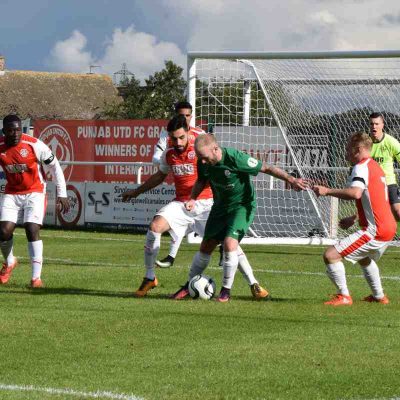The management team at Punjab United have described the response to the BBC documentary surrounding the club as “exceptional”.
The club were followed by the cameras towards the end of the 2018/2019 season as the team ended their first season in the Southern Counties East Football League twelve points clear of the relegation places.
“The response from all over the UK has been exceptional” explains Jugjit ‘Chipie’ Sian – the founder, chairman and manager of the club, speaking to KSN in the first of a two part interview.
“I think a lot of the Asians in Gravesend did not realise how far we are playing up the pyramid and how serious our football is” he adds. “I think it has opened their eyes and this will now lead to more people coming to watch us from all over.”
The club was founded in 2003 as a Sunday league team and has since grown into a semi professional club following their transition into the pyramid at the start of the 2016/2017 season.
“I think a lot of the Asians in Gravesend did not realise how far we are playing up the pyramid and how serious our football is. I think it has opened their eyes and this will now lead to more people coming to watch us from all over” continues Chipie.
And the community plays a huge role in the functioning of the club, as Chipie’s assistant and secretary of the club, Jindi Banwait explains: “We are breaking some big barriers down so for us it’s been all inclusive really.
“We’re reaching far out and we’re seeing that with the way our youth has developed so I think for us, the ethnic minority players are seeing this as a target they should be reaching. If they’re not coming here to play, then definitely come over and support.”
The fly on the wall documentary, which aired on BBC One, offered a raw insight into the running of a club at the level – including changing room arguments. “ I think this is what the BBC caught really well, that this is real life, passion in a changing room and this is what happens in the changing room up and down the country” says Chipie.
“That real life, real moment at that one time.”
Bainwait adds “[Chipie] didn’t change for the camera, he kept his language to himself and as a number two, there are times when you’ve got to let out so I’ll give him credit for that.
“He gets ten minutes or twelve minutes before a game to get his thoughts across before handing over to the coaches and my bits are either bleeped out or edited out because I couldn’t maintain my language quite as well! Jindi continues.
Despite the praise the short documentary piece received, there is still more around the club which the duo believe could have been included.
“There’s nothing too negative from my side” says Jindi, “but I would have expected just two points.
“Our youth setup would have been very good to see. We started from very humble beginnings seven or eight years ago and we’ve grown it into nearly seven youth teams with a variety of age groups. We’ve got some good coaches at the club with our under 15s” he adds, concluding with “we’ve also good some good BAME (black, Asian and minority ethnic) coaches at our club but I think we’re at an age now where we want to show that they know their stuff in the game.”
“I think if it was an hour documentary the BBC would have showed a lot more” says Chipie.
The manager adds “I understand that there was only 28 minutes or so. I think the club has come across very well. For publicity for a club like Punjab United Football Club, they chose us out of thousands and thousands of teams throughout the country. We’re truly blessed.”
He finished with “if I could change one thing, I’d at least have died my hair!”
Our two piece interview with Chipie and Jindi is available tomorrow with the pair looking back at last season and into the new campaign.






